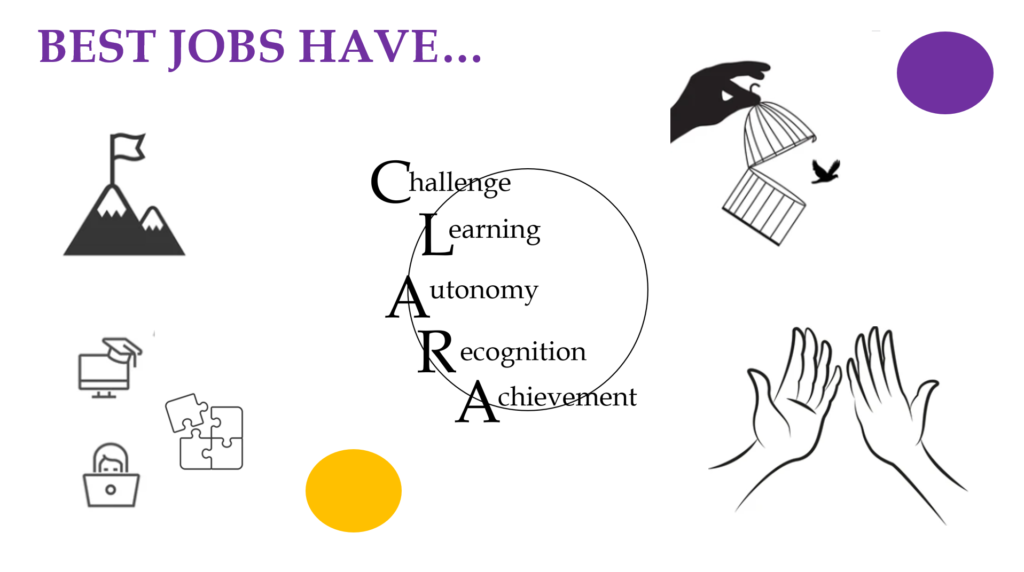
What’s the best job you’ve ever had? How old were you and what were you doing? And importantly, can you remember why the job was great?
I’ve been interested in what engages people at work for a long time and spent four years undertaking research into the drivers of engagement for my PhD. One of the outcomes from the research was the identification of the key attributes of a great job and the creation of a simple framework I’ve named the CLARA model.
The five elements of the CLARA model include Challenge, Learning Autonomy, Recognition and Achievement. The importance of each is described below.
CHALLENGE
Challenging jobs stretch us and bring out our best
Tough challenges force us to think and work harder. A challenge in your job could take many forms: solving a nutty problem, introducing a new system, or working with stakeholders with competing interests. These challenges typically get your brain sparking as you try to find the solution. To respond to the challenge, you draw on existing knowledge and seek new knowledge from other sources such as other people or web-based sources like Google.
It’s not surprising that when our job stops challenging us, we might look around for a new one.
LEARNING
Learning and mastering a skill is a wonderful and empowering thing
A logical extension of problem solving is learning. It will surprise few readers that when you’re engaged you love to learn. Learning can come when you’re working on your own, thinking deeply about a problem or when we’re discussing the problem with others. These are often the times when we’re most ‘in the zone’.
Here’s an example of learning from one of my interviews.
When I’m really sitting down and looking at a problem and I’m not sure what the solution could be and you might have an idea. And you often go into those trances where you are thinking – will this work? – yeah – where you are just thinking about your problem. It often happens because there are a lot of complicated things that are happening. Wallace
AUTONOMY
Autonomy is a staple of life – Give your team members freedom
This finding will surprise no one. Many researchers before me have reported how important autonomy is, particularly if you have a bit of experience. People love freedom: freedom to decide when and how work will be undertaken. Autonomy and freedom are all about having control, self-expression and the power to drive your work in the direction you think best. It’s also about the freedom to make mistakes.
Below are reflections from a few people who shared their work experience with me:
If I want to do something – I can just do it. There are no show stoppers. You can do it. It’s essentially up to you. John
He (my manager) really understands that and is letting me go off to do what I really need to do … We are super autonomous in what we do. Sally
ACHIEVEMENT
It feels great to achieve things – even little things
Jobs have different activities and objectives. The job could be one big project or many smaller tasks. Being able to put a tick on a To Do list or write the words DONE on a project status document gives a buzz of accomplishment. It feels great to achieve things, even little things. As these moments can often be fleeting it’s important not to miss them in the daily hustle and bustle of a work day..
Examples of times when those I interviewed experienced a sense of accomplishment included:
When you’ve got a good job where you don’t have anything that’s going to hold you up, where you can just be powering through it and everything is just running well, but also you’re feeling busy and that you’re accomplishing something. Ralph
At the end of the day you’re able to help people with tasks that they don’t do every day, that’s not their main task in their role. And they’re able to go away feeling that they’ve accomplished something. I feel like I’ve given them the best customer service I can. Marie
RECOGNITION
Everyone, and I mean everyone, regardless of how much experience they have appreciates a quiet nod or a few words of appreciation in recognition for a job well done. It’s like a super energy bar, adding a spring to your step. However, recognition moments can be easily missed in the busy-busy daily thrust of attending meetings, participating in phone calls and writing reports. A timely moment for a positive shout-out to a staff member can easily pass while everyone is on the daily treadmill of emails and presentations.
It’s hard to overstate how important recognition is. In a large organisation it’s possible to feel lost and invisible. Being recognised is a sign that you are valued. And we all want to be valued. Knowing that the things you do are appreciated makes a big difference to how you feel in showing up for work each day.
How did you go?
If you’d like to know more about what engages people then invite me in to chat with your managers and/or buy my book Engagement Whisperer: A quieter and more collaborative approach to inspiring your team.

Email me here: Tracy AT tjstanley.com